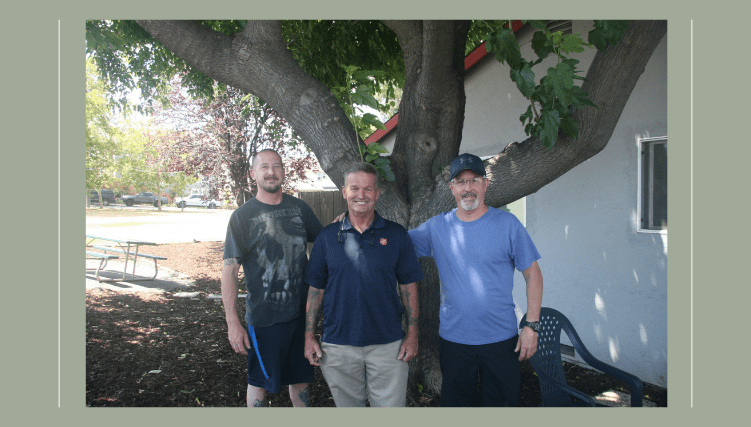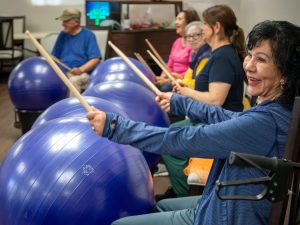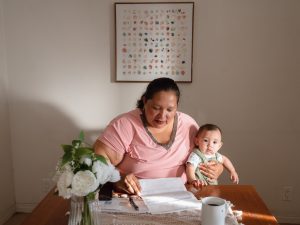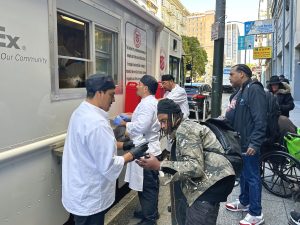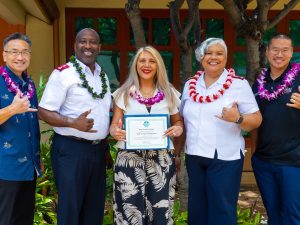Concord Transitional Living Program provides vital link in recovery process.
Mike O’Reilly runs a tight ship at The Salvation Army Transitional Living Program (TLP) in Concord, California, where 17 men make their temporary home in two-bedroom apartments. He does it with love and an understanding of the importance of this stop along the rehabilitation journey.
Most of the men come from the nearby Oakland (California) Adult Rehabilitation Center (ARC).
“There they’ve been made to follow the rules 100 percent; they don’t have the option to not follow them or they’re gone,” O’Reilly said. “And they know that. That’s what got them to where they’re at today. They want every chance they can get to succeed.”
O’Reilly emphasized the importance of programs like this. If individuals leave rehab and return to their old environment, “it’s like a kid in a candy store,” he said. “They go back to the same friends, the same issues, the same everything. And it leads right back to where they were before, so they end up relapsing.”
TLP senior resident Matt, a former heroin user, is making use of the TLP offerings. He gives O’Reilly credit for saving his life. O’Reilly picked him up off the street, let him stay at his house while he detoxed and got him into the ARC program, which he needed to complete before coming into the TLP. Today, Matt works as a certified counselor at a local detox center.
“I was a chronic relapser; I’d been through programs before,” Matt said. “You know, I didn’t want it bad enough. [This time] I really listened and did what I was told.”
In the TLP, the men have a curfew—11 p.m. on weekdays and midnight on weekends—plus church and Bible study at the Concord Corps.
“The spiritual element is the key to their sobriety,” O’Reilly said. “In my experience, without God in their—our—lives, the enemy wins. Every meeting we have consists of some sort of spiritual component.”
In addition, they all have jobs. Upon entering, they have a month to find one.
“You can’t just come here and sit around,” O’Reilly said. “That’s another thing that leads to relapse—sitting around and not doing anything. We’ve got to have purpose.”
The Concord Corps began the program in 2015. O’Reilly—with 15 years of recovery himself—has led it for seven years. Before that he worked at the Oakland ARC as intake coordinator and counselor after studying rehabilitation counseling at Diablo Valley College in Pleasant Hill, California.
“If it’s not broken, don’t fix it,” O’Reilly said. “I’ve always kept the same perspective on my guys. Every one of them has a 100 percent chance at recovery when they make the right choice…We give them the opportunity to make the right choice. If they don’t follow the rules, there are consequences.”
When O’Reilly found Matt at his lowest point, Matt had no intention of getting clean. His plan was to keep using, but he figured he’d tell O’Reilly what he wanted to hear.
Then he saw the apartments.
“The whole reason I gave this program a chance was because I saw how they were living here,” Matt said. “I walk into this guy’s house [transitional apartment unit], and he’s sitting enjoying chicken; people are watching TV. And to me, that was so foreign…I [once] had all this stuff, and all that was gone.”
This time, Matt made a different choice.
“Obviously God told [O’Reilly], “Give this guy a chance’…Meeting Mike and going in the program gave me the time I needed to get my mind straight and prioritize,” Matt said. “It was tough. I have no kids; my family wrote me off. I had just me and God.”
Along with enforcing the expectations of the house, O’Reilly performs random drug testing and cleanliness checks.
Resident Michael, who drives a coffee delivery truck, maintains a showcase apartment, and he enjoys showing it to visitors, even on the spur of the moment.
“They have to stay on top of it,” O’Reilly said. “For instance—no dishes in the sink.”
He said checking on the men randomly keeps them on top of things. “That’s my key; that’s my thing,” he said. “If they know I’m going to come every day at 3 o’clock to make sure [their apartment] is clean, they’ll make sure it’s clean. This gives them that opportunity to make the right choice. And then that develops their habit to be able to want to do that for themselves. That’s my theory.”
That theory is working for resident Robert, who said the TLP and its structure has given him a “solid foundation.”
“I’ve been able to discipline myself, to be consistent and to have this peace in my mind that has helped me in every aspect,” he said. “I get to do everything I ever wanted, plus work on myself.”
He’s developed a philosophy about recovery.
“Recovery is about helping others,” Robert said. “I help here in the [corps’ food] pantry, and if a brother needs help, I’ll try to help him…I’m grateful to God and to The Salvation Army.”
Residents typically stay in the program 12 to 18 months. To complete it, they must adhere to the rules and not relapse. The success rate averages about 70 percent, but O’Reilly said statistics don’t tell the real story.
“It’s up to each individual,” he said. “The program doesn’t change,” he said. “It’s just up to the person.”
Matt’s long-term goal is to grow in his faith and make rehabilitation counseling a career.
“I’ve just started,” he said. “You know, Mike’s done all this. Mike’s a great role model. And I owe him a lot. I don’t think he hears it enough. He saves lives, really. And if I could be in a position like that, I think life would be good.”
Do Good:
- More than red kettles and thrift stores—discover how The Salvation Army impacts people’s lives.
- What’s your story? How might it impact others? Here’s where to start your personal journey.
- Find out more about how The Salvation Army has fought addiction over the years.







